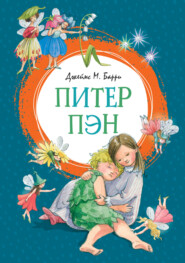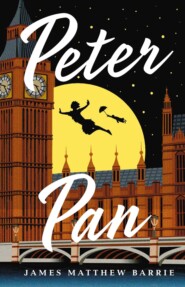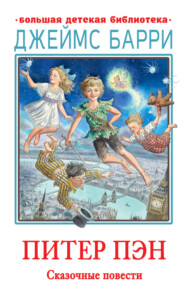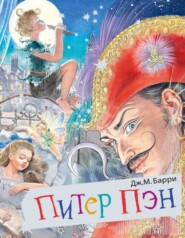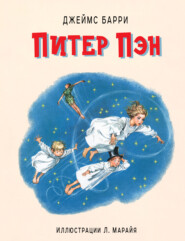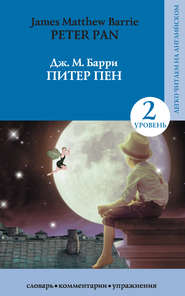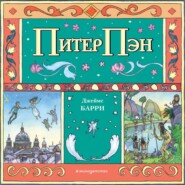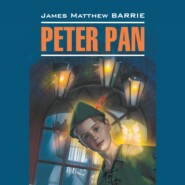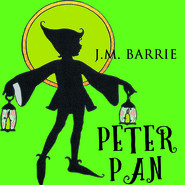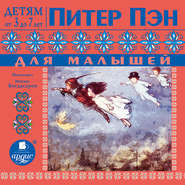По всем вопросам обращайтесь на: info@litportal.ru
(©) 2003-2024.
✖
Peter Pan
Автор
Год написания книги
2017
Настройки чтения
Размер шрифта
Высота строк
Поля
On the night we speak of all the children were once more in bed. It happened to be Nana’s evening off, and Mrs. Darling had bathed them and sung to them till one by one they had let go her hand and slid away into the land of sleep.
All were looking so safe and cosy that she smiled at her fears now and sat down tranquilly by the fire to sew.
It was something for Michael, who on his birthday was getting into shirts. The fire was warm, however, and the nursery dimly lit by three night-lights, and presently the sewing lay on Mrs. Darling’s lap. Then her head nodded, oh, so gracefully. She was asleep. Look at the four of them, Wendy and Michael over there, John here, and Mrs. Darling by the fire. There should have been a fourth night-light.
While she slept she had a dream. She dreamt that the Neverland had come too near and that a strange boy had broken through from it. He did not alarm her, for she thought she had seen him before in the faces of many women who have no children. Perhaps he is to be found in the faces of some mothers also. But in her dream he had rent the film that obscures the Neverland, and she saw Wendy and John and Michael peeping through the gap.
The dream by itself would have been a trifle, but while she was dreaming the window of the nursery blew open, and a boy did drop on the floor. He was accompanied by a strange light, no bigger than your fist, which darted about the room like a living thing and I think it must have been this light that wakened Mrs. Darling.
She started up with a cry, and saw the boy, and somehow she knew at once that he was Peter Pan. If you or I or Wendy had been there we should have seen that he was very like Mrs. Darling’s kiss. He was a lovely boy, clad in skeleton leaves and the juices that ooze out of trees but the most entrancing thing about him was that he had all his first teeth. When he saw she was a grown-up, he gnashed the little pearls at her.
Chapter 2 THE SHADOW
Mrs. Darling screamed, and, as if in answer to a bell, the door opened, and Nana entered, returned from her evening out. She growled and sprang at the boy, who leapt lightly through the window. Again Mrs. Darling screamed, this time in distress for him, for she thought he was killed, and she ran down into the street to look for his little body, but it was not there; and she looked up, and in the black night she could see nothing but what she thought was a shooting star.
She returned to the nursery, and found Nana with something in her mouth, which proved to be the boy’s shadow. As he leapt at the window Nana had closed it quickly, too late to catch him, but his shadow had not had time to get out; slam went the window and snapped it off.
You may be sure Mrs. Darling examined the shadow carefully, but it was quite the ordinary kind.
Nana had no doubt of what was the best thing to do with this shadow. She hung it out at the window, meaning “He is sure to come back for it; let us put it where he can get it easily without disturbing the children.”
But unfortunately Mrs. Darling could not leave it hanging out at the window, it looked so like the washing and lowered the whole tone of the house. She thought of showing it to Mr. Darling, but he was totting up winter great-coats for John and Michael, with a wet towel around his head to keep his brain clear, and it seemed a shame to trouble him; besides, she knew exactly what he would say: “It all comes of having a dog for a nurse.”
She decided to roll the shadow up and put it away carefully in a drawer, until a fitting opportunity came for telling her husband. Ah me!
The opportunity came a week later, on that never-to-be-forgotten Friday. Of course it was a Friday.
“I ought to have been specially careful on a Friday,” she used to say afterwards to her husband, while perhaps Nana was on the other side of her, holding her hand.
“No, no,” Mr. Darling always said, “I am responsible for it all. I, George Darling, did it. MEA CULPA, MEA CULPA.” He had had a classical education.
They sat thus night after night recalling that fatal Friday, till every detail of it was stamped on their brains and came through on the other side like the faces on a bad coinage.
“If only I had not accepted that invitation to dine at 27,” Mrs. Darling said.
“If only I had not poured my medicine into Nana’s bowl,” said Mr. Darling.
“If only I had pretended to like the medicine,” was what Nana’s wet eyes said.
“My liking for parties, George.”
“My fatal gift of humour, dearest.”
“My touchiness about trifles, dear master and mistress.”
Then one or more of them would break down altogether; Nana at the thought, “It’s true, it’s true, they ought not to have had a dog for a nurse.” Many a time it was Mr. Darling who put the handkerchief to Nana’s eyes.
“That fiend!” Mr. Darling would cry, and Nana’s bark was the echo of it, but Mrs. Darling never upbraided Peter; there was something in the right-hand corner of her mouth that wanted her not to call Peter names.
They would sit there in the empty nursery, recalling fondly every smallest detail of that dreadful evening. It had begun so uneventfully, so precisely like a hundred other evenings, with Nana putting on the water for Michael’s bath and carrying him to it on her back.
“I won’t go to bed,” he had shouted, like one who still believed that he had the last word on the subject, “I won’t, I won’t. Nana, it isn’t six o’clock yet. Oh dear, oh dear, I shan’t love you any more, Nana. I tell you I won’t be bathed, I won’t, I won’t!”
Then Mrs. Darling had come in, wearing her white evening-gown. She had dressed early because Wendy so loved to see her in her evening-gown, with the necklace George had given her. She was wearing Wendy’s bracelet on her arm; she had asked for the loan of it. Wendy loved to lend her bracelet to her mother.
She had found her two older children playing at being herself and father on the occasion of Wendy’s birth, and John was saying:
“I am happy to inform you, Mrs. Darling, that you are now a mother,” in just such a tone as Mr. Darling himself may have used on the real occasion.
Wendy had danced with joy, just as the real Mrs. Darling must have done.
Then John was born, with the extra pomp that he conceived due to the birth of a male, and Michael came from his bath to ask to be born also, but John said brutally that they did not want any more.
Michael had nearly cried. “Nobody wants me,” he said, and of course the lady in the evening-dress could not stand that.
“I do,” she said, “I so want a third child.”
“Boy or girl?” asked Michael, not too hopefully.
“Boy.”
Then he had leapt into her arms. Such a little thing for Mr. and Mrs. Darling and Nana to recall now, but not so little if that was to be Michael’s last night in the nursery.
They go on with their recollections.
“It was then that I rushed in like a tornado, wasn’t it?” Mr. Darling would say, scorning himself; and indeed he had been like a tornado.
Perhaps there was some excuse for him. He, too, had been dressing for the party, and all had gone well with him until he came to his tie. It is an astounding thing to have to tell, but this man, though he knew about stocks and shares, had no real mastery of his tie. Sometimes the thing yielded to him without a contest, but there were occasions when it would have been better for the house if he had swallowed his pride and used a made-up tie.
This was such an occasion. He came rushing into the nursery with the crumpled little brute of a tie in his hand.
“Why, what is the matter, father dear?”
“Matter!” he yelled; he really yelled. “This tie, it will not tie.” He became dangerously sarcastic. “Not round my neck! Round the bed-post! Oh yes, twenty times have I made it up round the bed-post, but round my neck, no! Oh dear no! begs to be excused!”
He thought Mrs. Darling was not sufficiently impressed, and he went on sternly, “I warn you of this, mother, that unless this tie is round my neck we don’t go out to dinner to-night, and if I don’t go out to dinner to-night, I never go to the office again, and if I don’t go to the office again, you and I starve, and our children will be flung into the streets.”
Even then Mrs. Darling was placid. “Let me try, dear,” she said, and indeed that was what he had come to ask her to do, and with her nice cool hands she tied his tie for him, while the children stood around to see their fate decided. Some men would have resented her being able to do it so easily, but Mr. Darling had far too fine a nature for that; he thanked her carelessly, at once forgot his rage, and in another moment was dancing round the room with Michael on his back.
“How wildly we romped!” says Mrs. Darling now, recalling it.
“Our last romp!” Mr. Darling groaned.
“O George, do you remember Michael suddenly said to me, ‘How did you get to know me, mother?’”
“I remember!”
“They were rather sweet, don’t you think, George?”






